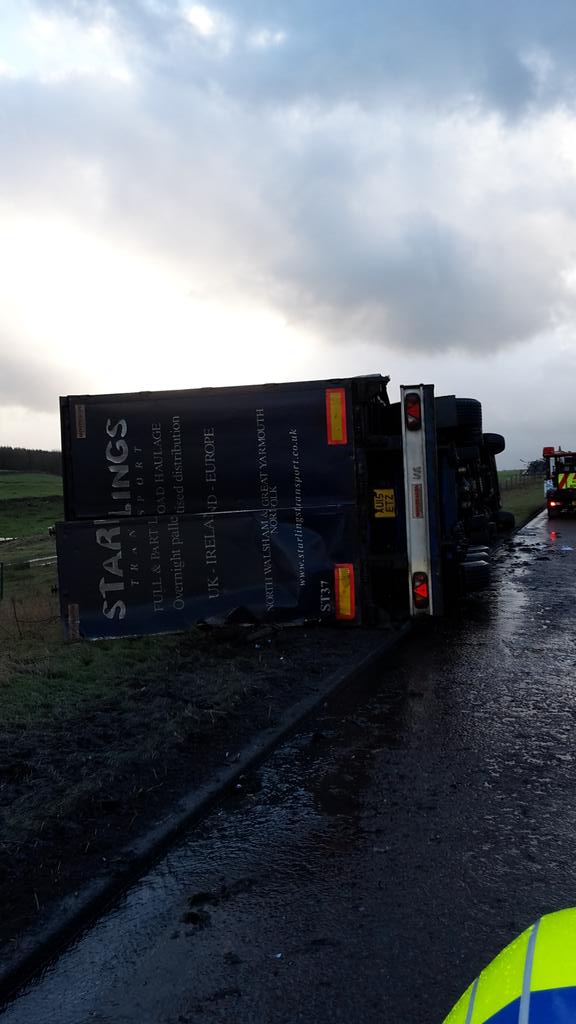By Kristina Pydynowski, Senior Meteorologist
January 29,2016; 10:07PM,EST
In the wake of Storm Gertrude, the United Kingdom may face a more impactful windstorm as January gives way to February.
Storm Gertrude will be remembered as a quick-hitting windstorm with the worst impacts across the northern British Isles Thursday night into Friday.
Winds gusted to 144 mph (232 km/h) at the summit of Cairngorm Mountain in Scotland, 91 mph (146 km/h) at South Uist Range in the Outer Hebrides and 87 mph (140 km/h) at Inverbervie, Scotland.
National Rail reported train services were halted during the height of the storm in Scotland.
While the strong winds will subside to start the weekend, there will continue to be gusts of 40 to 60 mph (65 to 95 km/h) along the northern coast of Northern Ireland and Scotland Friday night and Saturday as another depression follows on the heels of Storm Gertrude.
Strong winds M6 Shap. Wagon over. Slow down. Take care. #stormgertrude
Otherwise, wintry showers will fly across the rest of Northern Ireland, the north of England and Scotland on Saturday. A brisk wind and cooler air will be in place all across the British Isles to start the weekend.
Any snow still around on Sunday will gradually give way to rain as the next storm arrives.
Another round of travel disruptions, power cuts and tree damage can be expected Sunday night into Monday night, potentially over more of the U.K.
"Winds will be more of a bigger factor than rain. There will be more widespread wind gusts of 50 to 75 mph (80 to 120 km/h)," AccuWeather Meteorologist Tyler Roys said.
Winds will begin to increase from southwest to northeast across the British Isles Sunday into Sunday night with the strongest winds expected late Sunday night into Monday night.
Northern Ireland and Scotland will once again be at risk for the strongest winds. It is even possible for gusts to exceed 75 mph (120 km/h) along the western coast and in exposed areas.
Farther south, the potential exists for more frequent wind gusts past 50 mph (80 km/h) across Wales and the Midlands.
"Much of the strong winds will remain north of London," Roys said. However, the start of February will still be windier than what was experienced during Storm Gertrude. There could be an isolated gust to 50 mph (80 km/h).
When compared to Storm Gertrude, the upcoming windstorm will be more prolonged in many communities.
"Winds will likely even persist into early Tuesday," AccuWeather Meteorologist Courtney Spamer said.
RELATED:
Interactive United Kingdom radar
Check MinuteCast® for your location
Detailed forecast for London
The combination of the prolonged and more widespread nature of this wind event will put more of the U.K. at risk for scattered tree damage and power cuts.
Travel disruptions, which could be more lengthy than during Storm Gertrude, are possible. This includes to rail, ferry and airline services. Drivers of high-sided vehicles will face dangerous crosswinds.
The strong winds also threaten to trigger another round of coastal flooding along the western coast of the British Isles during high tide.
While the storm will be remembered more for its wind than rain, any significant rainfall can lead to new localized flooding problems in the saturated areas of Northern Ireland, western Scotland and North West England.
"The good news is that there will not be much rain for places around Cardiff, which has already received more than three times the normal monthly rainfall this January," Spamer said. "A band of light to moderate rain will fall on Sunday with very spotty showers to follow for the remainder of the storm."
The storm will also bring another surge of milder air that will have the first day of February feeling more like early spring, but the warmth will not last long.
Depending on the exact timing of the storm, Monday's high may occur during the morning hours before temperatures fall in Scotland and Northern Ireland. Temperatures will gradually trend back to more seasonable levels across the rest of the U.K. by midweek.


No comments:
Post a Comment